7 Best Fund of Funds in India 2026
fund of funds is one of the best Mutual Funds for investors whose investment amounts are not too large and it is easier to manage one fund (a fund of funds) rather than a number of Mutual Funds. In this form of mutual fund investment strategy, investors get to hold a number of funds under the umbrella of a single fund, hence the name funds of funds.
Often going by the name of multi-manager investment; it is considered as one of the mutual fund categories. One of the key advantages of multi-manager investments is that at a lower ticket size, the investor can diversify themselves across a gamut of mutual fund schemes. So let us go through the numerous aspects of fund of funds like why to invest in a fund of funds, advantages of fund of funds, fund of funds in India, the performance of fund of funds, and other important aspects.
What are Fund of Funds?
In simple words, a Mutual Fund Investing its collected pool of money in another mutual fund (one or maybe more) is referred to as fund of funds. Investors in their portfolios take exposure to different funds and keep track of them separately. However, by Investing in multi-manager mutual funds this process gets more simplified as investors need to track only one fund, which in turn holds numerous mutual funds within it. Assume an individual has invested in 10 different funds having exposure in various financial assets like stocks, Bonds, government securities, gold, etc. However, he finds it difficult in managing those funds as he needs to keep a track of each fund separately. Therefore, to avoid such hassles, the investor invests money in a multi-management investment (or a single funds of funds strategy) which has its stakes in different Mutual Funds.
What are the Types of Fund of Funds?
1. Asset allocation funds
These funds consist of a diverse asset pool – with securities comprising of equity, debt instruments, precious metals, etc. This allows Asset Allocation funds to generate high returns through the best performing instrument, at a reduced risk level guaranteed by the relatively stable securities present in the Portfolio.
2. Gold funds
Investing in different Mutual Funds, primarily trading in gold securities are gold funds. Fund of funds belonging to this category can have a portfolio of Mutual Funds or the gold trading companies themselves, depending upon the concerned asset management company.
3. International fund of funds
Mutual Funds operating in foreign countries are targeted by the international fund of funds. This allows investors to potentially yield higher returns through the best-performing stocks and bonds of the respective country.
4. Multi-manager fund of funds
This is the most common type of fund of funds Mutual Funds available in the market. The asset base of such a fund comprises of various professionally managed Mutual Funds, all of which have a different portfolio concentration. A multi-manager fund of funds usually has multiple portfolio managers, each dealing with a specific asset present in the Mutual Fund.
Talk to our investment specialist
5. ETF Fund of Funds
Fund of funds comprising Exchange Traded Fund in their portfolio is a popular investment tool in the country. Investing in an ETF through fund of funds is more accessible than a direct investment in this instrument. This is because ETFs require the a Demat Trading Account while investing in ETF fund of funds have no such limitations.
However, ETFs have a slightly higher risk factor associated with them as they are traded like shares in the stock market, making these fund of funds more susceptible to the Volatility of the market.
Who should Invest in Fund of Funds?
The main aim of the top fund of funds is to maximise returns by investing in a varied portfolio posing minimal risk. Individuals with access to a small pool of financial resources which they can spare for a more extended period of time can choose such a Mutual Fund. Since the portfolio of such funds consists of varying Types of Mutual Funds, it ensures access to high-value funds as well.
Ideally, investors with relatively fewer resources and low liquidity needs can choose to invest in the top fund of funds available in the market. This enables them to earn maximum returns at minimal risk.
Advantages of Investing in Fund of Funds
There are various benefits of investing in a fund of funds Mutual Fund –
1. Diversification
Fund of funds target various Best Performing Mutual Funds in the market, each specialising in a particular asset or sector of fund. This ensures gains through diversification, as both returns and risks are optimised due to underlying portfolio variety.
2. Professionally trained managers
Fund of funds is managed by highly trained people with years of experience. Proper analysis and calculated market predictions made by such portfolio managers ensure high yields through intricate investment strategies.
3. Low resource requirements
An individual with limited financial resources can easily invest in the top fund of funds available to earn higher profits. Monthly investment schemes can also be availed while choosing a fund of funds to invest in.
Limitations of Fund of Funds
1. Expense ratio
Expense ratios to manage a fund of funds Mutual Funds are higher than standard Mutual Funds, as it has a higher managing expense. Added expenses include primarily choosing the right asset to invest in, which keeps on fluctuating periodically.
2. Tax
Tax levied on a fund of funds are payable by an investor, only during redemption of the principal amount. However, during recovery, both short-term and long-term Capital Gains are subjected to tax deductions, depending upon the annual income of the investor and the time period of investment.
Fund Selection Methodology used to find 7 funds
Best Performing Fund of Funds to Invest 2026
Fund NAV Net Assets (Cr) 3 MO (%) 6 MO (%) 1 YR (%) 3 YR (%) 5 YR (%) 2024 (%) PGIM India Euro Equity Fund Growth ₹21.95
↑ 0.10 ₹1,187 23 24.9 38.4 24.6 2.9 18.3 Kotak Asset Allocator Fund - FOF Growth ₹262.488
↓ -0.55 ₹2,398 3.5 12.1 24 21.1 18.3 15.4 ICICI Prudential Nifty Next 50 Index Fund Growth ₹61.2116
↓ -0.81 ₹8,103 0.9 4.2 18.7 23.2 15.2 2.1 IDBI Nifty Junior Index Fund Growth ₹51.6352
↓ -0.68 ₹98 0.8 4.1 18.6 22.9 15.1 2 ICICI Prudential Advisor Series - Passive Strategy Fund Growth ₹169.023
↓ -1.71 ₹218 -0.7 5.3 16.4 18.5 15.6 11 IDBI Nifty Index Fund Growth ₹36.2111
↓ -0.02 ₹208 9.1 11.9 16.2 20.3 11.7 Aditya Birla Sun Life Financial Planning FOF Aggressive Plan Growth ₹55.1384
↑ 0.10 ₹230 -0.5 3.6 15.6 17 13.7 8.5 Note: Returns up to 1 year are on absolute basis & more than 1 year are on CAGR basis. as on 26 Feb 26 Research Highlights & Commentary of 7 Funds showcased
Commentary PGIM India Euro Equity Fund Kotak Asset Allocator Fund - FOF ICICI Prudential Nifty Next 50 Index Fund IDBI Nifty Junior Index Fund ICICI Prudential Advisor Series - Passive Strategy Fund IDBI Nifty Index Fund Aditya Birla Sun Life Financial Planning FOF Aggressive Plan Point 1 Upper mid AUM (₹1,187 Cr). Upper mid AUM (₹2,398 Cr). Highest AUM (₹8,103 Cr). Bottom quartile AUM (₹98 Cr). Lower mid AUM (₹218 Cr). Bottom quartile AUM (₹208 Cr). Lower mid AUM (₹230 Cr). Point 2 Established history (18+ yrs). Established history (21+ yrs). Established history (15+ yrs). Established history (15+ yrs). Oldest track record among peers (22 yrs). Established history (15+ yrs). Established history (14+ yrs). Point 3 Rating: 2★ (lower mid). Rating: 4★ (upper mid). Top rated. Rating: 5★ (upper mid). Not Rated. Rating: 1★ (bottom quartile). Rating: 2★ (lower mid). Point 4 Risk profile: High. Risk profile: Moderately High. Risk profile: Moderately High. Risk profile: Moderately High. Risk profile: Moderately High. Risk profile: Moderately High. Risk profile: Moderately High. Point 5 5Y return: 2.86% (bottom quartile). 5Y return: 18.30% (top quartile). 5Y return: 15.22% (upper mid). 5Y return: 15.15% (lower mid). 5Y return: 15.64% (upper mid). 5Y return: 11.74% (bottom quartile). 5Y return: 13.73% (lower mid). Point 6 3Y return: 24.55% (top quartile). 3Y return: 21.13% (lower mid). 3Y return: 23.24% (upper mid). 3Y return: 22.92% (upper mid). 3Y return: 18.52% (bottom quartile). 3Y return: 20.28% (lower mid). 3Y return: 17.01% (bottom quartile). Point 7 1Y return: 38.40% (top quartile). 1Y return: 23.95% (upper mid). 1Y return: 18.68% (upper mid). 1Y return: 18.58% (lower mid). 1Y return: 16.44% (lower mid). 1Y return: 16.16% (bottom quartile). 1Y return: 15.60% (bottom quartile). Point 8 1M return: 6.71% (top quartile). 1M return: 0.10% (bottom quartile). 1M return: 4.56% (upper mid). 1M return: 4.54% (upper mid). 1M return: 0.93% (bottom quartile). 1M return: 3.68% (lower mid). 1M return: 2.63% (lower mid). Point 9 Alpha: -14.91 (bottom quartile). Alpha: 0.00 (upper mid). Alpha: -0.79 (lower mid). Alpha: -0.88 (lower mid). Alpha: 2.63 (top quartile). Alpha: -1.03 (bottom quartile). Alpha: 1.25 (upper mid). Point 10 Sharpe: 1.57 (top quartile). Sharpe: 1.38 (upper mid). Sharpe: 0.17 (bottom quartile). Sharpe: 0.16 (bottom quartile). Sharpe: 0.49 (lower mid). Sharpe: 1.04 (upper mid). Sharpe: 0.34 (lower mid). PGIM India Euro Equity Fund
Kotak Asset Allocator Fund - FOF
ICICI Prudential Nifty Next 50 Index Fund
IDBI Nifty Junior Index Fund
ICICI Prudential Advisor Series - Passive Strategy Fund
IDBI Nifty Index Fund
Aditya Birla Sun Life Financial Planning FOF Aggressive Plan
*List of Funds based on Assets >= 50 Crore & Sorted based on 1 year Return.
(Erstwhile DHFL Pramerica Top Euroland Offshore Fund) The primary investment objective of the scheme is to generate long-term capital growth from a diversified portfolio of units of overseas mutual funds. Below is the key information for PGIM India Euro Equity Fund Returns up to 1 year are on The investment objective of the scheme is to generate long-term capital appreciation from a portfolio created by investing in
specified open-ended equity, and debt schemes of Kotak Mahindra Mutual Fund. However, there is no assurance that the investment objective of the Scheme will be realized Research Highlights for Kotak Asset Allocator Fund - FOF Below is the key information for Kotak Asset Allocator Fund - FOF Returns up to 1 year are on The fund's objective is to invest in companies whose securities are included in Nifty Junior Index and to endeavor to achieve the returns of the above index as closely as possible, though subject to tracking error. The fund intends to track only 90-95% of the Index i.e. it will always keep cash balance between 5-10% of the Net Asset to meet the redemption and other liquidity requirements. However, as and when the liquidity in the Index improves the fund intends to track up to 100% of the Index. The fund will not seek to outperform the CNX Nifty Junior. The objective is that the performance of the NAV of the fund should closely track the performance of the CNX Nifty Junior over the same period subject to tracking error. Research Highlights for ICICI Prudential Nifty Next 50 Index Fund Below is the key information for ICICI Prudential Nifty Next 50 Index Fund Returns up to 1 year are on The investment objective of the scheme is to invest in the stocks and equity related instruments comprising the CNX Nifty Junior Index in the same weights as these stocks represented in the Index with the intent to replicate the performance of the Total Returns Index of CNX Nifty Junior Index. The scheme will adopt a passive investment strategy and will seek to achieve the investment objective by minimizing the tracking error between the CNX Nifty Junior Index (Total Returns Index) and the scheme. Research Highlights for IDBI Nifty Junior Index Fund Below is the key information for IDBI Nifty Junior Index Fund Returns up to 1 year are on (Erstwhile ICICI Prudential Advisor Series - Long Term Savings Plan) The primary investment objective of this Plan is to seek to generate long term capital appreciation from a portfolio that is invested predominantly in the schemes of domestic or offshore Mutual Fund(s) mainly having asset allocation to: • Equity and equity related securities and • A small portion in debt and money market instruments. However, there can be no assurance that the investment objective of the Scheme will be realized. Research Highlights for ICICI Prudential Advisor Series - Passive Strategy Fund Below is the key information for ICICI Prudential Advisor Series - Passive Strategy Fund Returns up to 1 year are on The investment objective of the scheme is to invest in the stocks and equity related instruments comprising the S&P CNX Nifty Index in the same weights as these stocks represented in the Index with the intent to replicate the performance of the Total Returns Index of S&P CNX Nifty index. The scheme will adopt a passive investment strategy and will seek to achieve the investment objective by minimizing the tracking error between the S&P CNX Nifty index (Total Returns Index) and the scheme. Research Highlights for IDBI Nifty Index Fund Below is the key information for IDBI Nifty Index Fund Returns up to 1 year are on The Scheme aims to generate returns by investing in mutual fund schemes selected in accordance with the BSLAMC process, as per the risk-return profile of investors. Each of the 3 plans under the Scheme has a strategic asset allocation which is based on satisfying the needs to a specific risk-return profile of investors. There can be no assurance that the investment objective of the Scheme will be realized. Research Highlights for Aditya Birla Sun Life Financial Planning FOF Aggressive Plan Below is the key information for Aditya Birla Sun Life Financial Planning FOF Aggressive Plan Returns up to 1 year are on 1. PGIM India Euro Equity Fund
PGIM India Euro Equity Fund
Growth Launch Date 11 Sep 07 NAV (26 Feb 26) ₹21.95 ↑ 0.10 (0.46 %) Net Assets (Cr) ₹1,187 on 31 Jan 26 Category Others - Fund of Fund AMC Pramerica Asset Managers Private Limited Rating ☆☆ Risk High Expense Ratio 1.63 Sharpe Ratio 1.57 Information Ratio -0.14 Alpha Ratio -14.91 Min Investment 5,000 Min SIP Investment 1,000 Exit Load 0-12 Months (1%),12 Months and above(NIL) Growth of 10,000 investment over the years.
Date Value 31 Jan 21 ₹10,000 31 Jan 22 ₹8,152 31 Jan 23 ₹6,341 31 Jan 24 ₹6,684 31 Jan 25 ₹8,184 31 Jan 26 ₹10,977 Returns for PGIM India Euro Equity Fund
absolute basis & more than 1 year are on CAGR (Compound Annual Growth Rate) basis. as on 26 Feb 26 Duration Returns 1 Month 6.7% 3 Month 23% 6 Month 24.9% 1 Year 38.4% 3 Year 24.6% 5 Year 2.9% 10 Year 15 Year Since launch 4.4% Historical performance (Yearly) on absolute basis
Year Returns 2024 18.3% 2023 20.6% 2022 14.6% 2021 -35.6% 2020 -1.9% 2019 20.5% 2018 21.4% 2017 -10.3% 2016 14.6% 2015 -6.7% Fund Manager information for PGIM India Euro Equity Fund
Name Since Tenure Anandha Padmanabhan Anjeneyan 15 Feb 25 0.96 Yr. Vivek Sharma 15 Feb 25 0.96 Yr. Data below for PGIM India Euro Equity Fund as on 31 Jan 26
Asset Allocation
Asset Class Value Cash 1.93% Equity 98.07% Top Securities Holdings / Portfolio
Name Holding Value Quantity PGIM Jennison Emerging Mkts Eq USD W Acc
Investment Fund | -99% ₹1,171 Cr 934,875
↓ -3,115 Clearing Corporation Of India Ltd.
CBLO/Reverse Repo | -1% ₹15 Cr Net Receivables / (Payables)
Net Current Assets | -0% ₹1 Cr 2. Kotak Asset Allocator Fund - FOF
Kotak Asset Allocator Fund - FOF
Growth Launch Date 9 Aug 04 NAV (26 Feb 26) ₹262.488 ↓ -0.55 (-0.21 %) Net Assets (Cr) ₹2,398 on 31 Jan 26 Category Others - Fund of Fund AMC Kotak Mahindra Asset Management Co Ltd Rating ☆☆☆☆ Risk Moderately High Expense Ratio 1 Sharpe Ratio 1.38 Information Ratio 0 Alpha Ratio 0 Min Investment 5,000 Min SIP Investment 1,000 Exit Load 0-1 Years (1%),1 Years and above(NIL) Growth of 10,000 investment over the years.
Date Value 31 Jan 21 ₹10,000 31 Jan 22 ₹12,328 31 Jan 23 ₹13,722 31 Jan 24 ₹17,359 31 Jan 25 ₹20,012 31 Jan 26 ₹24,137 Returns for Kotak Asset Allocator Fund - FOF
absolute basis & more than 1 year are on CAGR (Compound Annual Growth Rate) basis. as on 26 Feb 26 Duration Returns 1 Month 0.1% 3 Month 3.5% 6 Month 12.1% 1 Year 24% 3 Year 21.1% 5 Year 18.3% 10 Year 15 Year Since launch 16.4% Historical performance (Yearly) on absolute basis
Year Returns 2024 15.4% 2023 19% 2022 23.4% 2021 11.3% 2020 25% 2019 25% 2018 10.3% 2017 4.4% 2016 13.7% 2015 8.8% Fund Manager information for Kotak Asset Allocator Fund - FOF
Name Since Tenure Abhishek Bisen 15 Nov 21 4.22 Yr. Devender Singhal 9 May 19 6.74 Yr. Data below for Kotak Asset Allocator Fund - FOF as on 31 Jan 26
Asset Allocation
Asset Class Value Cash 4.38% Equity 56.71% Debt 11.24% Other 27.66% Top Securities Holdings / Portfolio
Name Holding Value Quantity Kotak Gold ETF
- | -20% ₹470 Cr 36,077,481
↑ 4,130,000 Kotak Nifty PSU Bank ETF
- | -9% ₹225 Cr 2,497,000
↓ -1,200,000 Kotak Infra & Econ Reform Dir Gr
Investment Fund | -9% ₹214 Cr 28,411,378 Kotak Nifty IT ETF
- | -9% ₹210 Cr 50,200,000 Kotak Silver ETF
- | -8% ₹201 Cr 7,000,000
↑ 7,000,000 Kotak Consumption Dir Gr
Investment Fund | -8% ₹200 Cr 146,659,548 Kotak Gilt Inv Growth - Direct
Investment Fund | -6% ₹137 Cr 12,634,309 Kotak Bond Dir Gr
Investment Fund | -5% ₹113 Cr 12,869,186 Kotak Trsptn & Lgstcs Dir Gr
Investment Fund | -5% ₹109 Cr 95,899,303 Kotak Quant Dir Gr
Investment Fund | -4% ₹107 Cr 70,592,506 3. ICICI Prudential Nifty Next 50 Index Fund
ICICI Prudential Nifty Next 50 Index Fund
Growth Launch Date 25 Jun 10 NAV (27 Feb 26) ₹61.2116 ↓ -0.81 (-1.30 %) Net Assets (Cr) ₹8,103 on 31 Jan 26 Category Others - Index Fund AMC ICICI Prudential Asset Management Company Limited Rating ☆☆☆☆☆ Risk Moderately High Expense Ratio 0.66 Sharpe Ratio 0.17 Information Ratio -6.81 Alpha Ratio -0.79 Min Investment 5,000 Min SIP Investment 100 Exit Load 0-7 Days (0.25%),7 Days and above(NIL) Growth of 10,000 investment over the years.
Date Value 31 Jan 21 ₹10,000 31 Jan 22 ₹12,908 31 Jan 23 ₹12,335 31 Jan 24 ₹17,386 31 Jan 25 ₹19,803 31 Jan 26 ₹21,294 Returns for ICICI Prudential Nifty Next 50 Index Fund
absolute basis & more than 1 year are on CAGR (Compound Annual Growth Rate) basis. as on 26 Feb 26 Duration Returns 1 Month 4.6% 3 Month 0.9% 6 Month 4.2% 1 Year 18.7% 3 Year 23.2% 5 Year 15.2% 10 Year 15 Year Since launch 12.3% Historical performance (Yearly) on absolute basis
Year Returns 2024 2.1% 2023 27.2% 2022 26.3% 2021 0.1% 2020 29.5% 2019 14.3% 2018 0.6% 2017 -8.8% 2016 45.7% 2015 7.6% Fund Manager information for ICICI Prudential Nifty Next 50 Index Fund
Name Since Tenure Nishit Patel 18 Jan 21 5.04 Yr. Ajaykumar Solanki 1 Feb 24 2 Yr. Ashwini Shinde 18 Dec 24 1.12 Yr. Data below for ICICI Prudential Nifty Next 50 Index Fund as on 31 Jan 26
Asset Allocation
Asset Class Value Cash 0.08% Equity 99.88% Top Securities Holdings / Portfolio
Name Holding Value Quantity Vedanta Ltd (Basic Materials)
Equity, Since 31 Mar 21 | VEDL5% ₹413 Cr 6,063,111
↑ 66,403 Hindustan Aeronautics Ltd Ordinary Shares (Industrials)
Equity, Since 30 Sep 22 | HAL4% ₹313 Cr 678,121
↑ 7,419 TVS Motor Co Ltd (Consumer Cyclical)
Equity, Since 30 Sep 23 | TVSMOTOR4% ₹309 Cr 839,152
↑ 9,183 Divi's Laboratories Ltd (Healthcare)
Equity, Since 30 Sep 24 | DIVISLAB3% ₹275 Cr 454,113
↑ 4,968 Bharat Petroleum Corp Ltd (Energy)
Equity, Since 31 Mar 25 | BPCL3% ₹253 Cr 6,927,526
↑ 75,869 Britannia Industries Ltd (Consumer Defensive)
Equity, Since 31 Mar 25 | BRITANNIA3% ₹247 Cr 421,515
↑ 4,611 Cholamandalam Investment and Finance Co Ltd (Financial Services)
Equity, Since 30 Sep 21 | CHOLAFIN3% ₹247 Cr 1,511,537
↑ 16,549 Varun Beverages Ltd (Consumer Defensive)
Equity, Since 31 Mar 23 | VBL3% ₹230 Cr 4,891,051
↑ 53,565 Tata Power Co Ltd (Utilities)
Equity, Since 31 Aug 22 | TATAPOWER3% ₹220 Cr 6,001,759
↑ 65,730 Indian Oil Corp Ltd (Energy)
Equity, Since 31 Mar 22 | IOC3% ₹218 Cr 13,354,177
↑ 146,260 4. IDBI Nifty Junior Index Fund
IDBI Nifty Junior Index Fund
Growth Launch Date 20 Sep 10 NAV (27 Feb 26) ₹51.6352 ↓ -0.68 (-1.29 %) Net Assets (Cr) ₹98 on 31 Jan 26 Category Others - Index Fund AMC IDBI Asset Management Limited Rating ☆☆☆☆☆ Risk Moderately High Expense Ratio 0.86 Sharpe Ratio 0.16 Information Ratio -7.59 Alpha Ratio -0.88 Min Investment 5,000 Min SIP Investment 500 Exit Load NIL Growth of 10,000 investment over the years.
Date Value 31 Jan 21 ₹10,000 31 Jan 22 ₹12,917 31 Jan 23 ₹12,378 31 Jan 24 ₹17,354 31 Jan 25 ₹19,743 31 Jan 26 ₹21,212 Returns for IDBI Nifty Junior Index Fund
absolute basis & more than 1 year are on CAGR (Compound Annual Growth Rate) basis. as on 26 Feb 26 Duration Returns 1 Month 4.5% 3 Month 0.8% 6 Month 4.1% 1 Year 18.6% 3 Year 22.9% 5 Year 15.1% 10 Year 15 Year Since launch 11.2% Historical performance (Yearly) on absolute basis
Year Returns 2024 2% 2023 26.9% 2022 25.7% 2021 0.4% 2020 29.6% 2019 13.7% 2018 0.5% 2017 -9.3% 2016 43.6% 2015 6.9% Fund Manager information for IDBI Nifty Junior Index Fund
Name Since Tenure Sumit Bhatnagar 3 Oct 23 2.33 Yr. Data below for IDBI Nifty Junior Index Fund as on 31 Jan 26
Asset Allocation
Asset Class Value Cash 0.2% Equity 99.76% Top Securities Holdings / Portfolio
Name Holding Value Quantity Vedanta Ltd (Basic Materials)
Equity, Since 31 Mar 21 | VEDL5% ₹5 Cr 73,349
↑ 323 Hindustan Aeronautics Ltd Ordinary Shares (Industrials)
Equity, Since 30 Sep 22 | HAL4% ₹4 Cr 8,220
↑ 28 TVS Motor Co Ltd (Consumer Cyclical)
Equity, Since 30 Sep 23 | TVSMOTOR4% ₹4 Cr 10,179
↑ 78 Divi's Laboratories Ltd (Healthcare)
Equity, Since 30 Sep 24 | DIVISLAB3% ₹3 Cr 5,483
↓ -10 Bharat Petroleum Corp Ltd (Energy)
Equity, Since 31 Mar 25 | BPCL3% ₹3 Cr 83,789
↑ 583 Cholamandalam Investment and Finance Co Ltd (Financial Services)
Equity, Since 30 Sep 21 | CHOLAFIN3% ₹3 Cr 18,293
↑ 139 Britannia Industries Ltd (Consumer Defensive)
Equity, Since 31 Mar 25 | BRITANNIA3% ₹3 Cr 5,086
↓ -10 Varun Beverages Ltd (Consumer Defensive)
Equity, Since 31 Mar 23 | VBL3% ₹3 Cr 59,223
↑ 921 Tata Power Co Ltd (Utilities)
Equity, Since 31 Aug 22 | TATAPOWER3% ₹3 Cr 72,891
↑ 465 Indian Oil Corp Ltd (Energy)
Equity, Since 31 Mar 22 | IOC3% ₹3 Cr 161,388
↑ 1,060 5. ICICI Prudential Advisor Series - Passive Strategy Fund
ICICI Prudential Advisor Series - Passive Strategy Fund
Growth Launch Date 18 Dec 03 NAV (27 Feb 26) ₹169.023 ↓ -1.71 (-1.00 %) Net Assets (Cr) ₹218 on 31 Jan 26 Category Others - Fund of Fund AMC ICICI Prudential Asset Management Company Limited Rating Risk Moderately High Expense Ratio 0.42 Sharpe Ratio 0.49 Information Ratio 0.69 Alpha Ratio 2.63 Min Investment 5,000 Min SIP Investment 1,000 Exit Load 0-3 Years (1%),3 Years and above(NIL) Growth of 10,000 investment over the years.
Date Value 31 Jan 21 ₹10,000 31 Jan 22 ₹13,088 31 Jan 23 ₹13,606 31 Jan 24 ₹18,002 31 Jan 25 ₹20,107 31 Jan 26 ₹22,417 Returns for ICICI Prudential Advisor Series - Passive Strategy Fund
absolute basis & more than 1 year are on CAGR (Compound Annual Growth Rate) basis. as on 26 Feb 26 Duration Returns 1 Month 0.9% 3 Month -0.7% 6 Month 5.3% 1 Year 16.4% 3 Year 18.5% 5 Year 15.6% 10 Year 15 Year Since launch 13.6% Historical performance (Yearly) on absolute basis
Year Returns 2024 11% 2023 15.9% 2022 29.3% 2021 4.2% 2020 30.3% 2019 10.7% 2018 6.7% 2017 4% 2016 19.2% 2015 11.2% Fund Manager information for ICICI Prudential Advisor Series - Passive Strategy Fund
Name Since Tenure Sankaran Naren 5 Sep 18 7.41 Yr. Dharmesh Kakkad 28 May 18 7.69 Yr. Sharmila D'Silva 13 May 24 1.72 Yr. Masoomi Jhurmarvala 4 Nov 24 1.24 Yr. Data below for ICICI Prudential Advisor Series - Passive Strategy Fund as on 31 Jan 26
Asset Allocation
Asset Class Value Cash 5.05% Equity 94.94% Top Securities Holdings / Portfolio
Name Holding Value Quantity ICICI Pru Nifty Private Banks ETF
- | -19% ₹42 Cr 14,607,963
↑ 750,000 ICICI Pru Nifty Bank ETF
- | -14% ₹31 Cr 5,073,440 ICICI Pru Nifty FMCG ETF
- | -12% ₹26 Cr 4,719,300
↑ 380,000 ICICI Pru Nifty IT ETF
- | -11% ₹25 Cr 5,871,290
↓ -262,000 Nippon India Nifty Pharma ETF
- | -8% ₹18 Cr 8,035,000
↑ 785,000 ICICI Prudential Nifty Oil & Gas ETF
- | -8% ₹18 Cr 14,916,960
↑ 1,060,000 ICICI Prudential Nifty Metal ETF
- | -7% ₹16 Cr 13,253,493
↓ -5,500,000 ICICI Prudential Nifty Auto ETF
- | -7% ₹15 Cr 5,281,500
↑ 200,000 Groww BSE Power ETF
- | -6% ₹12 Cr 12,500,000
↑ 3,100,000 Motilal Oswal Nifty Realty ETF
- | -3% ₹6 Cr 725,000 6. IDBI Nifty Index Fund
IDBI Nifty Index Fund
Growth Launch Date 25 Jun 10 NAV (28 Jul 23) ₹36.2111 ↓ -0.02 (-0.06 %) Net Assets (Cr) ₹208 on 30 Jun 23 Category Others - Index Fund AMC IDBI Asset Management Limited Rating ☆ Risk Moderately High Expense Ratio 0.9 Sharpe Ratio 1.04 Information Ratio -3.93 Alpha Ratio -1.03 Min Investment 5,000 Min SIP Investment 500 Exit Load NIL Growth of 10,000 investment over the years.
Date Value 31 Jan 21 ₹10,000 31 Jan 22 ₹12,652 31 Jan 23 ₹12,934 Returns for IDBI Nifty Index Fund
absolute basis & more than 1 year are on CAGR (Compound Annual Growth Rate) basis. as on 26 Feb 26 Duration Returns 1 Month 3.7% 3 Month 9.1% 6 Month 11.9% 1 Year 16.2% 3 Year 20.3% 5 Year 11.7% 10 Year 15 Year Since launch 10.3% Historical performance (Yearly) on absolute basis
Year Returns 2024 2023 2022 2021 2020 2019 2018 2017 2016 2015 Fund Manager information for IDBI Nifty Index Fund
Name Since Tenure Data below for IDBI Nifty Index Fund as on 30 Jun 23
Asset Allocation
Asset Class Value Top Securities Holdings / Portfolio
Name Holding Value Quantity 7. Aditya Birla Sun Life Financial Planning FOF Aggressive Plan
Aditya Birla Sun Life Financial Planning FOF Aggressive Plan
Growth Launch Date 9 May 11 NAV (26 Feb 26) ₹55.1384 ↑ 0.10 (0.19 %) Net Assets (Cr) ₹230 on 31 Jan 26 Category Others - Fund of Fund AMC Birla Sun Life Asset Management Co Ltd Rating ☆☆ Risk Moderately High Expense Ratio 1.16 Sharpe Ratio 0.34 Information Ratio 1.01 Alpha Ratio 1.25 Min Investment 1,000 Min SIP Investment 100 Exit Load 0-365 Days (1%),365 Days and above(NIL) Growth of 10,000 investment over the years.
Date Value 31 Jan 21 ₹10,000 31 Jan 22 ₹12,300 31 Jan 23 ₹12,626 31 Jan 24 ₹16,288 31 Jan 25 ₹18,076 31 Jan 26 ₹19,772 Returns for Aditya Birla Sun Life Financial Planning FOF Aggressive Plan
absolute basis & more than 1 year are on CAGR (Compound Annual Growth Rate) basis. as on 26 Feb 26 Duration Returns 1 Month 2.6% 3 Month -0.5% 6 Month 3.6% 1 Year 15.6% 3 Year 17% 5 Year 13.7% 10 Year 15 Year Since launch 12.2% Historical performance (Yearly) on absolute basis
Year Returns 2024 8.5% 2023 16.9% 2022 24.5% 2021 3.6% 2020 21.1% 2019 19.2% 2018 6.9% 2017 -2.6% 2016 26.5% 2015 7.5% Fund Manager information for Aditya Birla Sun Life Financial Planning FOF Aggressive Plan
Name Since Tenure Vinod Bhat 16 Aug 19 6.47 Yr. Dhaval Joshi 21 Nov 22 3.2 Yr. Data below for Aditya Birla Sun Life Financial Planning FOF Aggressive Plan as on 31 Jan 26
Asset Allocation
Asset Class Value Cash 3.48% Equity 59.75% Debt 36.65% Other 0.11% Top Securities Holdings / Portfolio
Name Holding Value Quantity HDFC Corporate Bond Dir Gr
Investment Fund | -20% ₹46 Cr 13,497,845
↑ 4,399,994 Aditya BSL Short Term Dir Gr
Investment Fund | -18% ₹41 Cr 7,783,726
↑ 1,220,794 Nippon India Growth Mid Cap Dir Gr
Investment Fund | -13% ₹30 Cr 66,254 Aditya BSL Flexi Cap Dir Gr
Investment Fund | -13% ₹29 Cr 139,592 ICICI Prudential Large Cap Dir Gr
Investment Fund | -12% ₹28 Cr 2,299,601 Kotak Multicap Dir Gr
Investment Fund | -12% ₹28 Cr 13,582,933 Aditya BSL Large Cap Dir Gr
Investment Fund | -11% ₹25 Cr 416,293 Clearing Corporation Of India Limited
CBLO/Reverse Repo | -1% ₹3 Cr Net Receivables / (Payables)
Net Current Assets | -0% -₹1 Cr Aditya BSL Gov Sec Dir Gr
Investment Fund | -₹0 Cr 00
↓ -759,409
Advantages of Fund of Funds
Like every mutual fund, fund of funds also has numerous advantages. Some of them are:
1. Portfolio Diversification and Fund Allocation
One of the key primary benefits is portfolio diversification. Here, despite investing in one single fund, the investment is made in several mutual fund schemes, where the fund is allocated in an optimal manner with the aim to earn maximum returns at a given level of risk.
2. Gateway for Diversified Assets
Multi-management investment helps retail investors to get access to funds that are not easily available for investments. A single fund of fund can take exposure in turn to Equity Funds, debt funds or even commodity based mutual funds. This ensures diversification for the retail investor by just getting into one Mutual fund.
3. Due Diligence Process
All the funds under this category are expected to follow a due diligence process conducted by the fund manager where they need to check the background and credentials of the underlying fund managers before making an investment to ensure the strategy is in-line with expectations.
4. Less Investment Amount
This is a good option for retail investors who wish to venture into this investment avenue with a lower ticket size.
How Does a Fund of Fund Works?
For understanding the modalities of how multi-manager investment functions, it is important to understand the concepts of fettered and unfettered management. Fettered management is a situation when the mutual fund invests its money in a portfolio containing assets and funds managed by its own company. In other words, the money is invested in the funds of the same asset management company. In contrast, unfettered management is a situation where the mutual fund invests in external funds managed by other Asset Management Companies. Unfettered funds have an advantage over fettered funds as they can exploit opportunities from numerous funds and other schemes instead of limiting themselves to the same family funds.
Why Choose Fund of Funds?
The following image gives clarity on how multi-management investment can help an individual instead of a simple mutual fund to achieve their objectives.
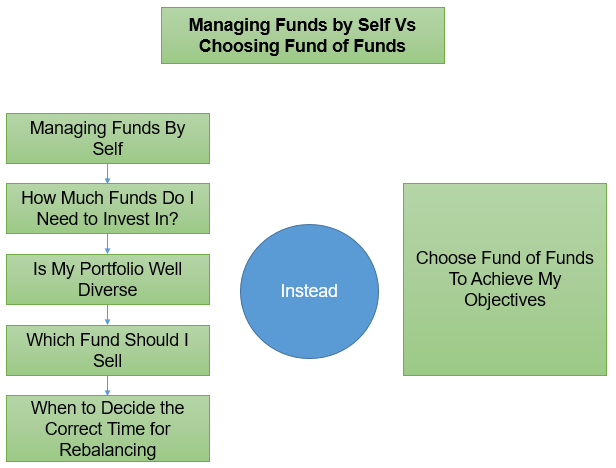
Though multi-management investment has a lot of benefits associated with it, one of the important factors that one needs to be aware of is the fee associated with it. Investors should be aware of any charges or expenses that a mutual fund will attract and make their investments accordingly. Therefore, in a nutshell, it can be concluded fund of funds is an ideal investment option for investors who seek to enjoy a hassle free investment in mutual funds.
How to Invest in FOF Mutual Funds Online?
Open Free Investment Account for Lifetime at Fincash.com.
Complete your Registration and KYC Process
Upload Documents (PAN, Aadhaar, etc.). And, You are Ready to Invest!
FAQs
1. What is the most significant advantage of FOFs?
A: The most significant advantage of FOFs is that it diversifies your investment and ensures good returns. If you are planning to diversify your investment portfolio, it is good to invest in FOFs. It reduces your risk and ensures that you enjoy good returns on your investments.
2. What are the different types of FOFs?
A: There are five different types of FOFs, and these are as follows:
- Asset Allocation funds
- Gold funds
- International FOFs
- ETF FOFs
- Multi-manager FOFs
Each of the FOF has unique features. For example, in gold funds you will invest in gold ETF and in multi-managers FOFs you will invest in different types of mutual funds.
3. What are the parameters to consider while investing in FOFs?
A: FOFs are mutual funds, hence, when you invest you should consider your risk taking capacity and the amount of money you want to invest. The percentage of returns you expect in the given time will give you an idea of your capacity to take risks. Based on that, you should evaluate the money you want to invest. Your financial condition should also help you decide how much money you should invest in FOFs.
Once you have assessed these two factors, select a particular FOF and start investing.
4. Which FOF has shown the best returns?
A: Gold FOFs are considered one of the most secure investments. These are like gold ETFs, and when you invest in gold FOF, it is like investing in physical gold without the added issues like paying GST, Sales Tax, or wealth tax. This investment is secure as gold price never falls extensively compared to the market and hence, produces good returns. Thus, often gold FOF is considered one of the best and safest investments.
5. Is there any commonest FOFs?
A: The Exchange Traded Funds or the ETFs are the most popular FOFs as investing in these funds is the easiest. All you need to do is open a Demat account to trade in ETFs, and there are no limitations as to the amount of money you can invest in ETFs.
6. What is one of the most critical limitations of FOF?
A: It is taxable. As an investor, you will have to pay tax on the principal amount when you redeem your investment. If you invest in FOF for the short-term, you will have to pay taxes on the principal and the returns. However, dividend earned is not taxable as the fund house bears the taxes.
7. Do FOFs have a long lock-in period?
A: Different FOFs have different investment periods. However, if you want to earn maximum returns, you must invest in FOFs for a reasonably long time.
All efforts have been made to ensure the information provided here is accurate. However, no guarantees are made regarding correctness of data. Please verify with scheme information document before making any investment.
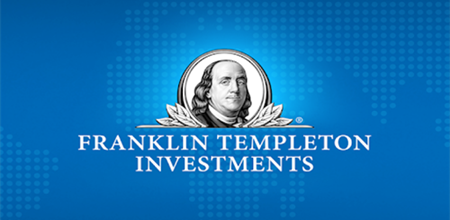
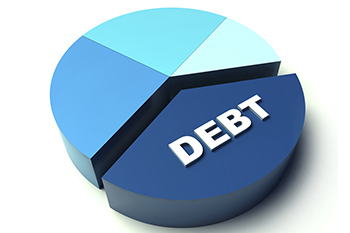
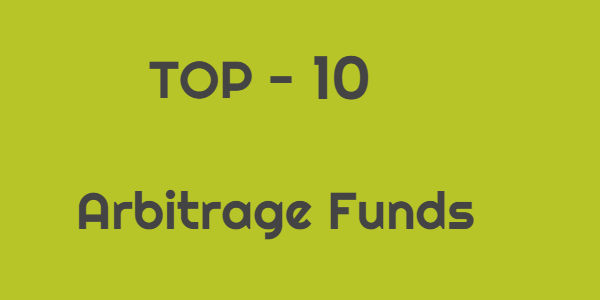


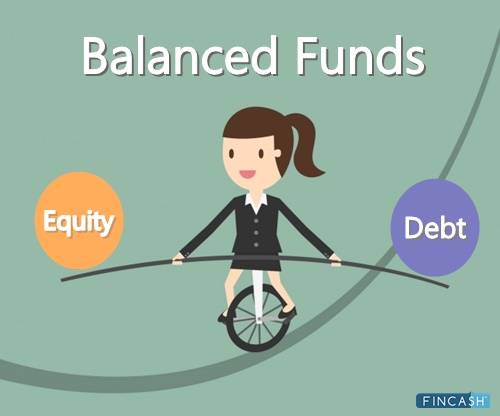

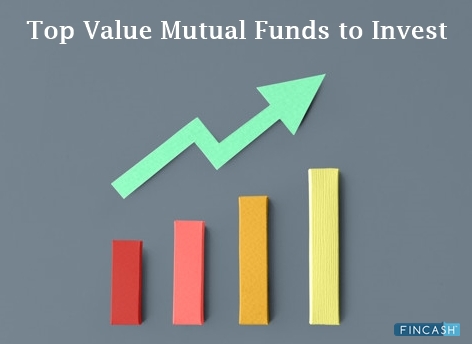





Research Highlights for PGIM India Euro Equity Fund